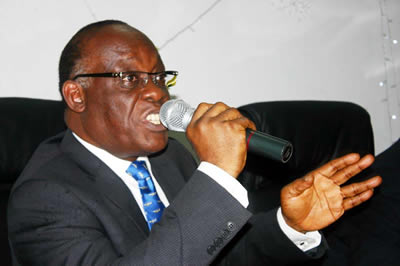The Enugu State University of Science and Technology (ESUT), Enugu, has expressed its desire to collaborate with the Nigerian Meteorological Agency (Nimet) to set up a Weather/Disaster Risk Reduction Centre (WEDRRC).
This is just as the Federal Government has thrown a big challenge to the academic community in Nigeria to rise up and contribute its quota to the resolution of climate change issues through vigorous research and establishment of basic weather observatories across the country in order to increase the density of weather data collection in Nigeria.
The Director General/CEO of Nimet, Doctor Anthony Anuforom, who threw the challenge while delivering the Lecture of the 17th Convocation Ceremony of ESUT, recently, pledged the readiness of his agency to collaborate and provide guidance to ensure that such observatories are set up and operated in compliance with World Meteorological Organization (WMO) standards.
In the Lecture entitled “Weather Observation, Modelling and Forecasting for Managing Climate Change Impacts,” Anuforom opined that considering the “cross-cutting and multifaceted nature of climate change issues, greater inter-disciplinary research is recommended as no single organisation, ministry, department or agency can tackle it alone.
As a way of allaying the fears of the academic community on the potential capital outlay needed to fund the establishment of the said Weather Observatories, he said Conventional Instruments for weather observation are relatively inexpensive and therefore affordable, insisting that it is within the reach of universities and other institutions to establish them.
He said the deluge of data that can potentially be collected by such Observatories would not only increase the body of knowledge in the subject matter, but also help in addressing the challenges of Climate Change in Nigeria.
Anuforom further declared that Nigeria is highly vulnerable to Climate Change based on the Maplesoft Climate Change Vulnerability Index which places the country as the third most vulnerable country in the world, stressing that “this is an issue of serious concern that requires decisive and coordinated action.”
He however acknowledged the huge efforts of the federal government to combat the challenges through its support for Nimet to sustain the provision of world class weather and climate services. He also acknowledged the federal government’s support of the Nigerian Hydrological Services Agency (NIHSA) as well as other agencies in this regard.
To guarantee sustainable success, he recommended the resuscitation and completion of the Development of a National Framework for Application of Climate Services (NFACS) which was conceptual prized in 2013 to “provide a mechanism or platform that brings together climate information providers (such as NiMet), end-users, researchers and other stakeholders to facilitate the production and timely dissemination of science-based information.
“Like the Global Framework for Climate Services (GFCS) developed by WMO, the proposed NFACS will enable Nigerians manage the risks and opportunities arising from climate variability and change by providing science-based information to the most vulnerable and incorporating such information into planning, policy formulation and implementation at all levels of government,” he declared.
Anuforom noted that in every part of Nigeria, there are indigenous methods of coping with weather and climate variability, mentioning the traditional ‘rain makers’ in the South East and other parts of Nigeria as an example of such practices based on indigenous knowledge. He therefore charged the academia to carry out further research into these indigenous practices and methods of climate adaptation with a view to establishing and documenting any underpinning science, and possibly integrating them into conventional practices.
In his address of welcome, Vice Chancellor of ESUT, Prof. Luke Anike said the institution has always encouraged the audience to engage in intellectual and faithful reflection and to ask speakers to elaborate on items that pique the interest of the audience.
Anike added that the Convocation Lecture Series brought to the University distinguished scholars, members of the academia, scientists, policy makers and gurus in both the private and public sectors to discuss issues pertinent to national development.
He commended Anuforom for playing a key role in the development of a National Framework for the Application of Climate Services (NFACS) to enable Nigeria better manage climate related risks and harness the associated opportunities in the context of achieving sustainable socio-economic development.


